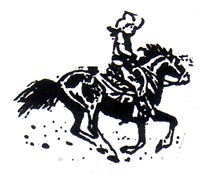|

This story was published in Radio Recall, the journal of the Metropolitan Washington Old-Time Radio Club, published six times per year.
Click here to return to the index of selected articles.
|
|
BOOK REVIEW BY JOHN HEIMANN
(From Radio Recall, August 2006)
 Stewart Wright's monograph, Gunsmoke: The Myth of the Prime-Time Repeats, represents a fascinating insight into the arcane research of truly committed OTR fans. Mr. Wright's thesis is that the 64 so-called "reruns", or "repeats", played during prime time, of the original prime-time airings of GUNSMOKE between 1952 and 1961 "...were, actually, new productions of previously used GUNSMOKE scripts". The author defines a "rerun" as "...the re-airing of a previously broadcast, transcribed episode of a program", adding that "...commercials may change on such re-airings but "...the cast, crew, characters, dialog, and plot line must remain the same as the original airing". He points out that there were, in fact, "...over 200 "reruns" of GUNSMOKE episodes...", but these did not (underlined) occur in prime-time and were the result of a weekly re-airing on Saturday of the prime-time shows aired on the previous Sunday "...between mid-October, 1954 and early February 1959". Stewart Wright's monograph, Gunsmoke: The Myth of the Prime-Time Repeats, represents a fascinating insight into the arcane research of truly committed OTR fans. Mr. Wright's thesis is that the 64 so-called "reruns", or "repeats", played during prime time, of the original prime-time airings of GUNSMOKE between 1952 and 1961 "...were, actually, new productions of previously used GUNSMOKE scripts". The author defines a "rerun" as "...the re-airing of a previously broadcast, transcribed episode of a program", adding that "...commercials may change on such re-airings but "...the cast, crew, characters, dialog, and plot line must remain the same as the original airing". He points out that there were, in fact, "...over 200 "reruns" of GUNSMOKE episodes...", but these did not (underlined) occur in prime-time and were the result of a weekly re-airing on Saturday of the prime-time shows aired on the previous Sunday "...between mid-October, 1954 and early February 1959".
He cites ESCAPE and SUSPENSE; JEFF REGAN, INVESTIGATOR and JOHNNY DOLLAR, INSURANCE INVESTIGATOR; GUNSMOKE and FORT LARAMIE as instances of series which re-used altered scripts from their respective counterparts. GUNSMOKE and FORT LARAMIE had a strong connection since both were produced and directed by Norman MacDonnell and dealt with common themes of that Western era. Moreover, several scripts from both shows clearly reflect re-use of the same material.
Mr. Wright obviously devoted enormous effort to his self-appointed task of disproving the myth that the 64 radio GUNSMOKE "reruns" he cites were nothing more than repeats of earlier shows. He first acquired all 474 broadcast known to be in circulation, listening to all of them, compiling -– and entering into a database -- cast, character and crew credits mentioned at the end of most broadcasts, using "audio identification" of the actors when credits were absent, and examining nearly 350 radio GUNSMOKE scripts residing at 3 research libraries and the libraries of several OTR clubs. As a result, Mr. Wright was able to conclusively determine that all of the so-called GUNSMOKE "Prime-Time Repeats" were actually new productions of previously used scripts.
The remainder (and the bulk) of his monograph is devoted to a detailed presentation of the major differences which distinguish each of the 64 prime-time reruns from the originals. These are categorized as differences in time length, dialog, characters' names, cast and crew names (actors, announcers, and/or sound effects artists), and, in a few instances, writer credits.
For the serious fan of radio GUNSMOKE who has acquired a copy of the Barabas compendium of both radio and television GUNSMOKE shows, Mr. Wright's monograph will be a welcome supplement. The Barabas text, published by McFarland & Co. Inc., provides titles, plot summaries, writer credits and guest cast names of all original airings but provides the title, date of airing and the single word "Rerun" for each of the stories on which Mr. Wright lavishes his attention.
Additionally, Mr. Wright's monograph contains several interesting sidebars on various aspects of the radio GUNSMOKE shows. For me the most fascinating -- and the most detailed -- is a short essay on John Dehner, a marvelous actor who appeared widely on both radio and television, who, according to Mr. Wright, "...turned down the role of Matt Dillon...because he thought he might get typecast as an actor who specialized in playing Western roles...(y)et...went on to appear in at least 234 of the 480 radio GUNSMOKE episodes (not to mention his starring roles in 41 radio episodes of FRONTIER GENTLEMAN and 105 episodes of radio HAVE GUN, WILL TRAVEL.

Finally, Mr. Wright provides an extensive table of contents, a bibliography, an apparently comprehensive index, separate lists of scripts used twice and scripts used three times, and a short, interesting discussion of episodes with the same title but completely different story lines. The monograph is printed on standard 8 1/2 x 11" stock, with a spiral binding and a handsome cover of heavier stock.
I have two minor cavils: (1) More careful editing would have eliminated slips and omissions such as the following sentence on page 2: "FORT LARAMIE was a radio series dealt with the military aspect of Western expansion in a realistic manner". (2) I wish that Mr. Wright's plot summaries provided more than a tantalizing tease of the full story (a criticism equally applicable to the Barabas book in which the plot summaries are usually longer but no more satisfying to this reader).
Mr. Wright's monograph can be obtained from the author for $20, including handling and shipping in the United States, by sending check or money order to: Stewart M. Wright/8120 W. 26th Avenue, Apt. 17, Lakewood, CO 80214.
|